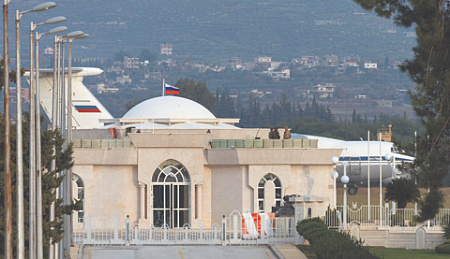
The United States has sent demands to the Syrian transitional administration that it must fulfill in order to ease sanctions. These are the destruction of chemical weapons stocks left over, according to Washington, from the regime of Bashar al-Assad, cooperation in the fight against terrorists and assistance in the search for an American citizen. The list differs from the conditions put forward earlier by the Senate. In particular, the White House does not insist that Syria deny Russia access to two military bases.
Sources of the Reuters news agency told about the list. According to them, Washington demanded that Damascus destroy chemical weapons stockpiles left over from the Assad government, ensure cooperation in the fight against global terrorist organizations operating in the Middle East, and refuse to accept foreign fighters into senior positions.
We are also talking about helping to find Austin Tice, an American freelancer who mysteriously disappeared in 2012 after being detained by Syrian intelligence services while passing through one of the capital’s checkpoints.
Fulfilling all the requirements that Natasha Franceschi, Deputy Assistant Secretary of State for the Middle East and Syria, handed over to the Syrian side in Brussels on March 18 will help ease American sanctions against Damascus, according to Reuters sources. One of the concrete steps in this direction, which the administration of US President Donald Trump is ready for, may be a two-year extension of the official exemption from sanctions. This paragraph concerns financial transactions with Syrian government institutions. Perhaps the White House will develop another “window” in the sanctions regime, which will enable the national economy to get back on the post-war rails, according to Reuters.
The list of current requirements partly repeats the one presented in February by Jim Risch, Chairman of the U.S. Senate Committee on Foreign Affairs. However, an important exception in the current version was that the White House did not demand that Syria close Russia’s access to two military bases. Recall that, speaking at a meeting of the relevant committee, Risch insisted that the transitional administration in Damascus should expel Moscow and Tehran from its territory. “Moscow should not use its port in the Mediterranean Sea (meaning Tartus), threatening the United States or our allies,” the senator said in February, adding that this was one of the indicators of whether restrictions could be lifted from the Syrian leadership.
According to Israeli media reports, it was the government headed by Prime Minister Benjamin Netanyahu that actively lobbied Washington for the need to preserve Russian bases. According to Reuters, Israeli officials tried to convince the Trump administration that Moscow was the guarantor of the security of Israel’s borders and the entire coast of Syria. According to this information, the American authorities were surprised by such arguments, pointing out that Turkey, as a NATO member, could become a guarantor for Israel. However, according to Reuters sources, the Israeli side strongly opposed this, saying that Ankara, after strengthening its position in Syria, poses a serious threat.
As Walla reported recently, Israeli military and intelligence circles have recently held several rounds of internal consultations on the consequences of the expansion of Turkish influence in Syria. The negotiators agreed that the danger of this theater of operations is growing, and a clash between Israel and Turkey on Syrian territory seems inevitable. The solution is to build up Israeli forces in southern Syria, as well as the struggle to preserve Russian bases, Walla sources say. The Netanyahu government believes that preserving the Russian military presence will become an immunity against Turkey taking control of Syrian military facilities, including in coastal areas.
This position is not officially disclosed in Israel. As Alexander Ben-Zvi, acting ambassador of the Jewish state to Russia, said in a conversation with TASS the other day, his country does not discuss the fate of Russian bases with Moscow. “This issue should be resolved by Russia and Syria, not by us,” the diplomat expressed confidence. However, he added: “Regardless of where the threat comes from, it doesn’t matter if it’s Shiite militias or Iranian groups, we will do everything to ensure our safety. And that includes a number of things.”
So far, Syria is facing a serious governance crisis. The change of power in Damascus on December 8, 2024 created the conditions for prolonged instability in the country, according to a recent annual report released by the office of the Director of National Intelligence of the United States. According to the authors of the report, this may contribute to the revival of the Islamic State (IS) in Syria (recognized as a terrorist organization in Russia and banned) and other Islamist groups. Even if the interim administration in Damascus is able to unite all institutions, “managing Syria will remain a difficult task against the background of the country’s economic problems, humanitarian needs, general instability, as well as ethnic and religious divisions,” the report says.
The US intelligence Community recalls that in early March, formations loyal to the Syrian transitional government carried out massacres and extrajudicial executions in the coastal provinces. Their target was the Alawites, a religious group from which ex–President Bashar al-Assad and former representatives of his political entourage come. This suggests that Syria’s interim president al-Sharaa cannot fully control his supporters, who are still plotting revenge against those ethnic and religious groups on which the previous government relied.
“Some of the remaining jihadist groups refuse to join the Ministry of Defense, headed by Hayat Tahrir al-Sham (HTS) (a group that is recognized as terrorist in Russia and banned, acted as a striking force for anti-Assad formations. – “NG”), and the IG has already expressed its disagreement with the HTS’s call for democratization and planned attacks to undermine its management,” the American intelligence services added, recalling that al-Sharaa himself was once associated with Al-Qaeda (recognized as terrorist in Russia and banned) and therefore, it does not inspire confidence.
